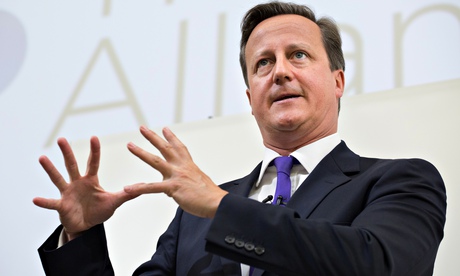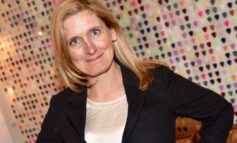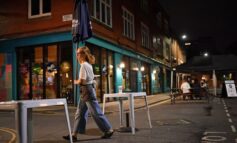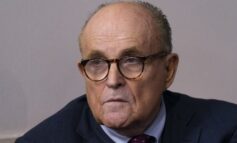Prime minister addresses CBI Scotland to argue that the single market underpins Scotland’s economic success

David Cameron will plead with Scottish voters on Thursday not to abandon one of the “oldest and most successful single markets in the world”, after the home secretary, Theresa May, highlighted nerves in the pro-union campaign, warning that it needed to redouble its efforts.
As the referendum campaign enters its final stage the prime minister will seek to warn wavering voters of the dangers of separating from the UK by raising the prospect that Scotland’s financial services could lose 90% of their business if voters endorsed independence on 18 September.
Cameron will acknowledge that questions over the economy lie at the heart of the referendum campaign when he says that key Scottish industries are underpinned by membership of the UK.
In a speech to the CBI Scotland conference in Glasgow, he will say that 90% of Scottish financial services’ customers live in England, Wales and Northern Ireland, while Scotland’s computer gaming industry and its “cutting-edge sub-sea technology” benefit from selling across the UK without transaction costs.
His arrival comes as the Scottish first minister, Alex Salmond, receives a boost from 150 business leaders who have signed a letter supporting independence. The signatories include Ralph Topping, the former chief executive of William Hill, and Tom Barrie, managing director of the logistics company Currie European.
Details of the letter emerged a day after 130 prominent business leaders, including the HSBC chairman Douglas Flint, signed an open letter warning that the case for Scottish independence had not been made.
Cameron will tell his audience: “This is one of the oldest and most successful single markets in the world. Scotland does twice as much trade with the rest of the UK than with the rest of the world put together – trade that helps to support one million Scottish jobs.
“For some industries, the proportion of trade with the rest of the UK is even higher – 90% of Scottish financial services’ customers are in England, Wales and Northern Ireland. Then there’s the world-famous gaming industry, cutting-edge subsea technology and life-saving biomedicine – all selling far more outside Scotland than inside.
“This success doesn’t happen by accident. It happens because of the skill of people in Scotland and the opportunities that come from being part of something bigger, a large domestic market, underpinned by a common currency, common taxes, common rules and regulations, with no borders, no transaction costs, no restrictions on the flow of goods, investment or people. Ours really is an economy of opportunity.”
But Salmond will seek to build on momentum in the yes camp after the Better Together leader, Alistair Darling, struggled in their final televised debate on Monday night to name job-creating powers that Westminster would be prepared to devolve to Holyrood. The first minister will outline a range of such powers – including control over air passenger duty and employment policy – that would be guaranteed by independence, as he calls on the prime minister to make clear what powers Westminster is prepared to guarantee.
The first minister, who described Darling as “a frontman for the Conservative party”, will say: “Scotland is one of the richest countries in the world – wealthier per head than the UK, France and Japan, so we are more than capable of being an economically successful independent country …
“I have challenged David Cameron to a debate, now that Mr Darling has said he will refuse any more head-to-head encounters – but whether he accepts that challenge or not, the PM must use his visit to Scotland to say what powers Westminster is guaranteeing, to allow the job-creating businesses of Scotland to boost employment and the economy.”
As the temperature rose in advance of Cameron’s visit, the home secretary said the UK government could take nothing for granted. In a speech to the Conservative Friends of the Union rally in Dumfries, May said: “We need to redouble our efforts – use every second that remains to persuade those who are still undecided, expose the unanswered questions of the yes campaign, get our vote out – and say ‘no, thanks’ to a separate Scotland. I know you’ve been working incredibly hard for the past two years – this has been a long and intense campaign.”
She reinforced her message by saying that an independent Scotland would have to build up its own intelligence agencies from scratch. May said: “All countries face complex national security threats from many different sources. The UK’s security and intelligence agencies help to protect us against these threats.
“We spend some £33bn a year on defence, and over £2bn a year for the security and intelligence agencies and National Cyber Security Programme. An independent Scotland would not be able to share these agencies. It would have to build its own infrastructure – and pick up the bill.”
The prime minister last visited Glasgow at the beginning of August to attend a ceremony in Glasgow cathedral to honour the unknown fallen of the first world war, and spoke at the Commonwealth Games business conference at the end of July.
The prime minister’s arrival in Scotland so close to the referendum vote is likely to attract some controversy. The Radical Independence Campaign says it expects hundreds at a hastily organised protest outside the CBI Scotland dinner tomorrow evening.
Co-founder, Jonathan Shafi said that Scots were “deeply angry” at the policies of the Westminster coalition.
“David Cameron’s government is making millions of people’s lives a misery across the UK. We believe a yes vote will be a rejection of his cuts and privatisation agenda, as well as being an opportunity to develop a social alternative to austerity.”
Shafi added: “Cameron refuses to debate the question publicly, so it’s no surprise that he comes up here to address a dinner of the corporate elite at the Hilton.”
The Electoral Commission said yesterday afternoon that, although the dinner did constitute campaigning, they were satisfied that it did not cost over their £10,000 limit and thus the CBI Scotland would not have to formally register as a campaigner the referendum.(theguardian.com, 2014)
Credit to theguardian.com
Follow us [adsenseyu1]













Leave a Reply